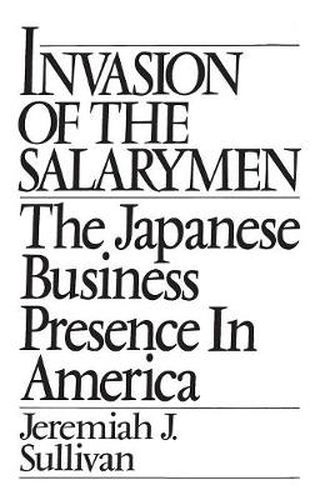Readings Newsletter
Become a Readings Member to make your shopping experience even easier.
Sign in or sign up for free!
You’re not far away from qualifying for FREE standard shipping within Australia
You’ve qualified for FREE standard shipping within Australia
The cart is loading…






During the 1980s a host of books on management proclaimed the triumph of Japanese companies’ emphasis on corporate values, loyalty, lifetime employment and consensus. In the first full-length study of Japanese direct investment in the United States, Sullivan shows that Japanese companies generally have not performed well and that part of their problem is poor management. Contrary to popular belief, management practices in Japan are rooted in the clever use of power rather than the development loyalty or values. While the system of highly authoritarian but benevolent managers and submissive employees has transferred well to some rural manufacturing firms in the U.S., it has fared poorly in urban areas. Using the result sof extensive interviews and surveys, Sullivan begins by profiling both an effective and an ineffective Japanese manager in the US. He describes their reactions to America’s individualism, patriotism, and day to day work practices. Broadening the focus, he describes economic and strategic reasons for the rush of Japanese direct investment and summarizes the data on profitability (low), productivity (less than US owned firms), and the impact on the American economy (generally beneficial or at least harmless). Japanese maangement philosophy and practices are analyzed in terms of the idea of work, the nature of a company, and the function of profit. Also discussed are lifetime employment, trust-building, decision making, and communication in the organization. These practices are shown in use both in Japan and in Japanese firms in America. Several chapters describe training of Japanese managers for work in the United States and of Americans in Japanese-owned companies.
$9.00 standard shipping within Australia
FREE standard shipping within Australia for orders over $100.00
Express & International shipping calculated at checkout
During the 1980s a host of books on management proclaimed the triumph of Japanese companies’ emphasis on corporate values, loyalty, lifetime employment and consensus. In the first full-length study of Japanese direct investment in the United States, Sullivan shows that Japanese companies generally have not performed well and that part of their problem is poor management. Contrary to popular belief, management practices in Japan are rooted in the clever use of power rather than the development loyalty or values. While the system of highly authoritarian but benevolent managers and submissive employees has transferred well to some rural manufacturing firms in the U.S., it has fared poorly in urban areas. Using the result sof extensive interviews and surveys, Sullivan begins by profiling both an effective and an ineffective Japanese manager in the US. He describes their reactions to America’s individualism, patriotism, and day to day work practices. Broadening the focus, he describes economic and strategic reasons for the rush of Japanese direct investment and summarizes the data on profitability (low), productivity (less than US owned firms), and the impact on the American economy (generally beneficial or at least harmless). Japanese maangement philosophy and practices are analyzed in terms of the idea of work, the nature of a company, and the function of profit. Also discussed are lifetime employment, trust-building, decision making, and communication in the organization. These practices are shown in use both in Japan and in Japanese firms in America. Several chapters describe training of Japanese managers for work in the United States and of Americans in Japanese-owned companies.